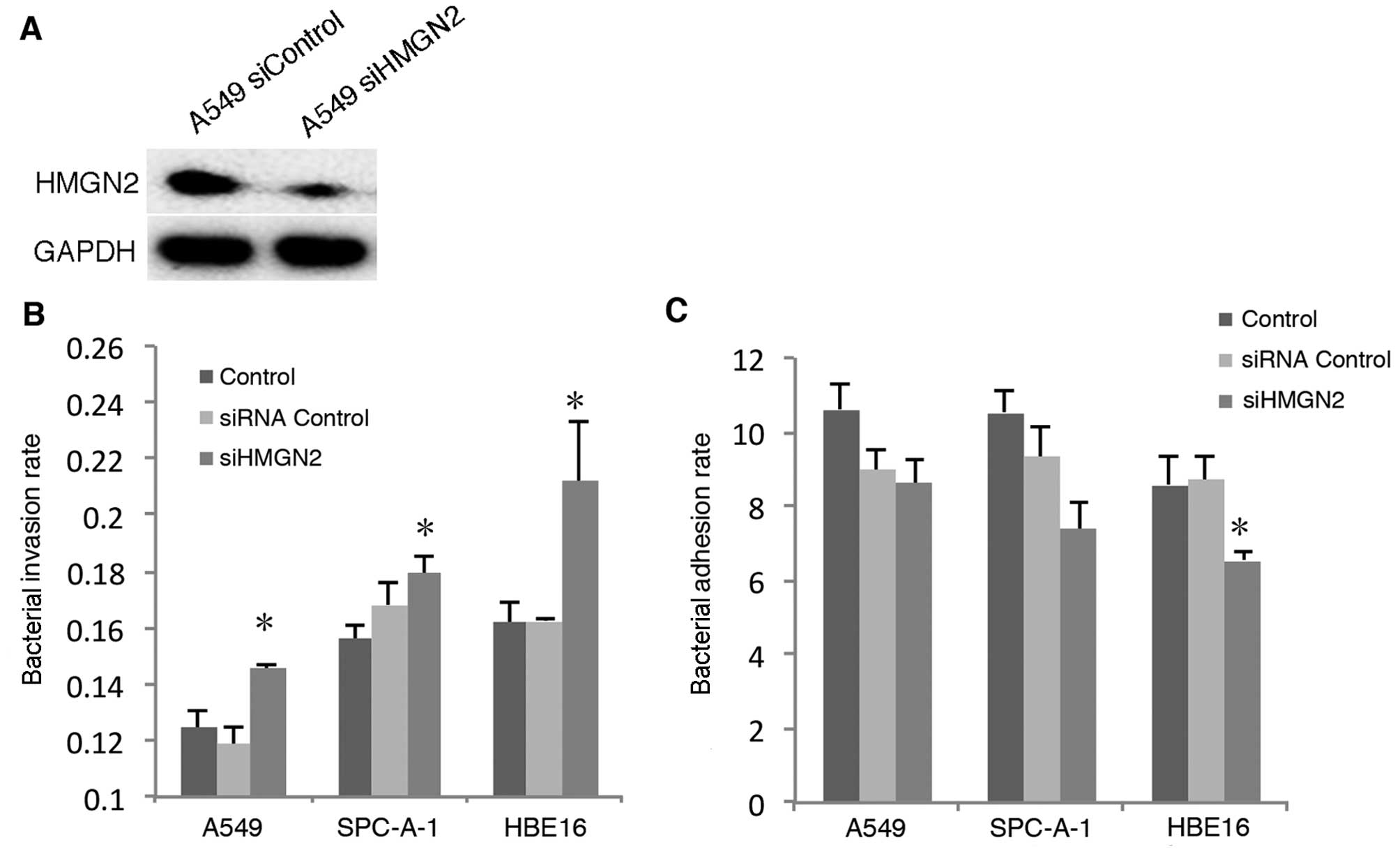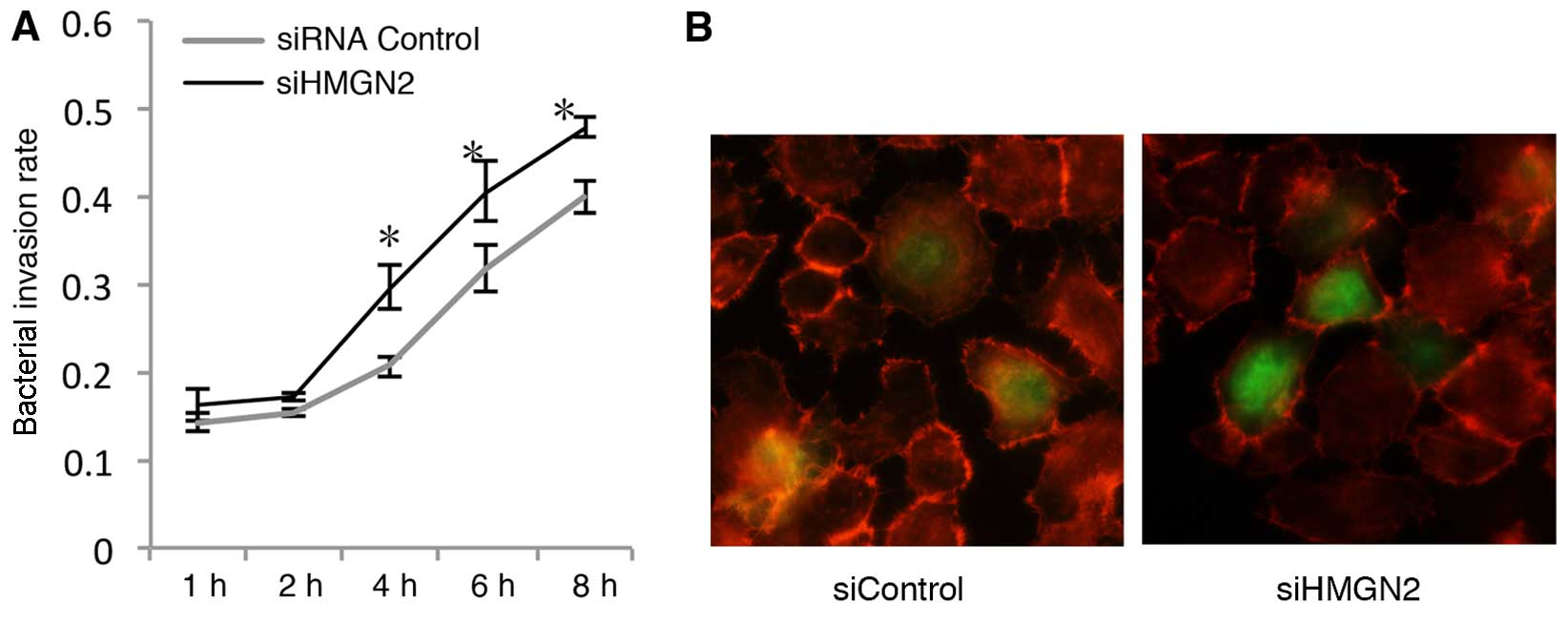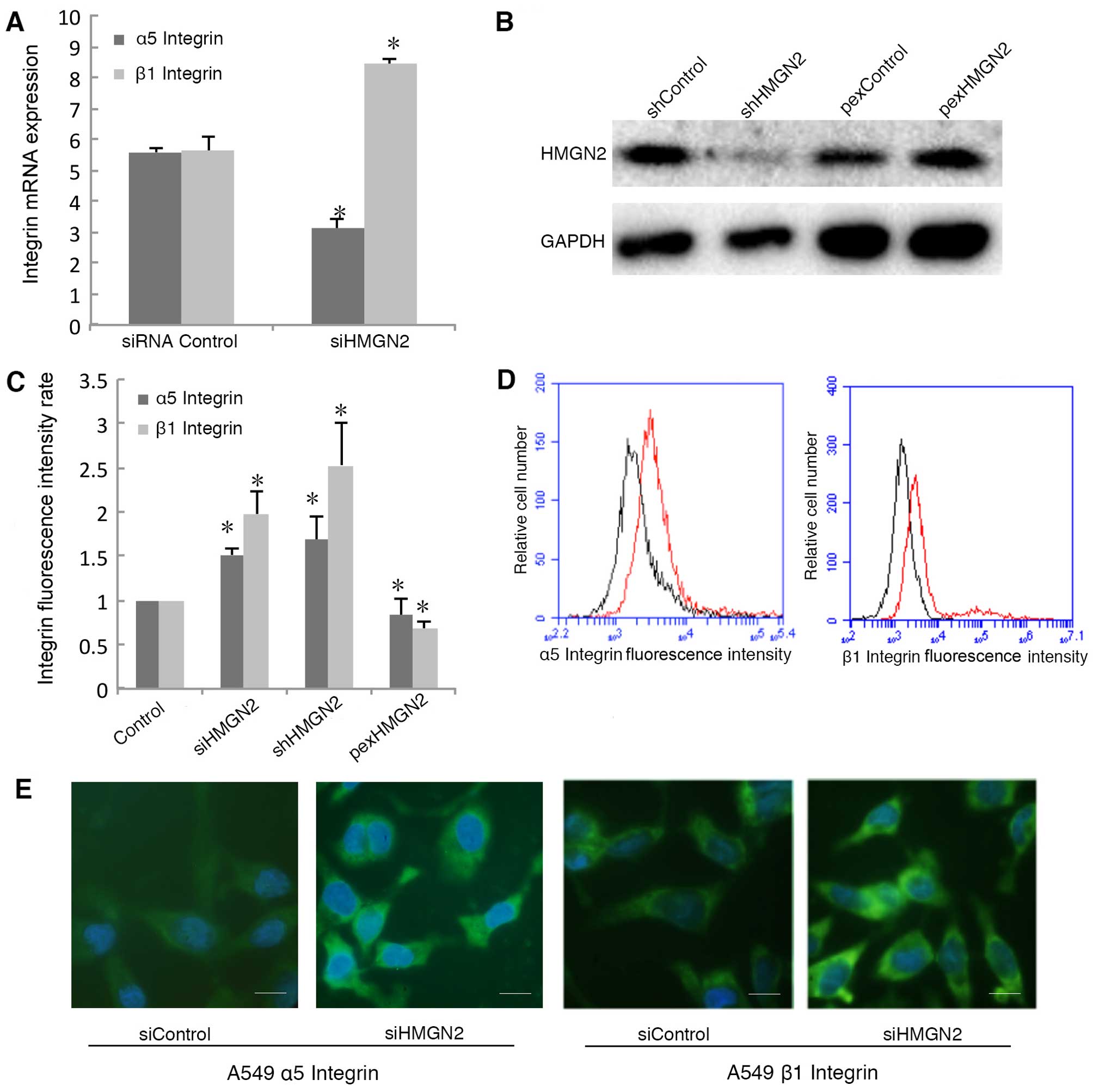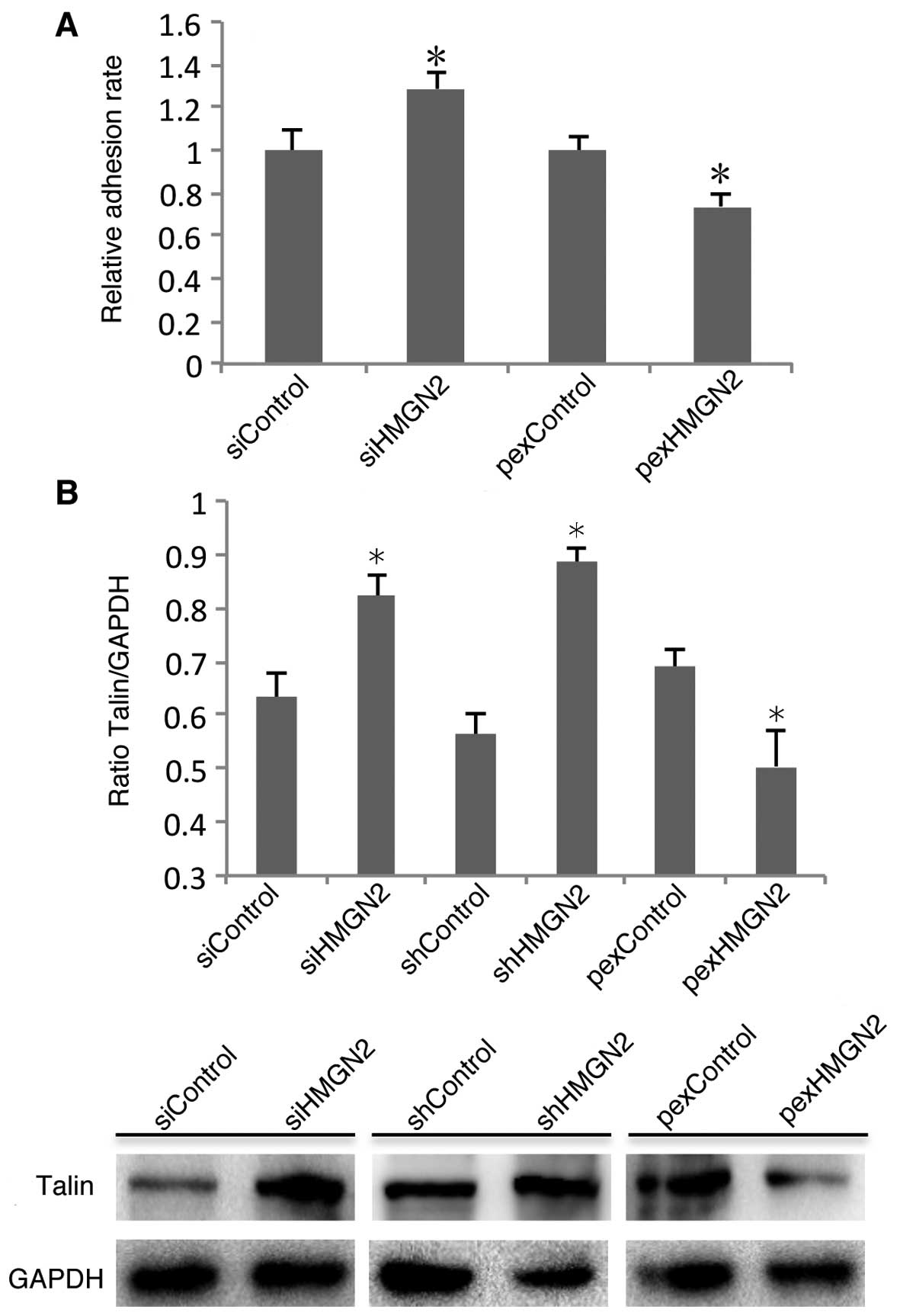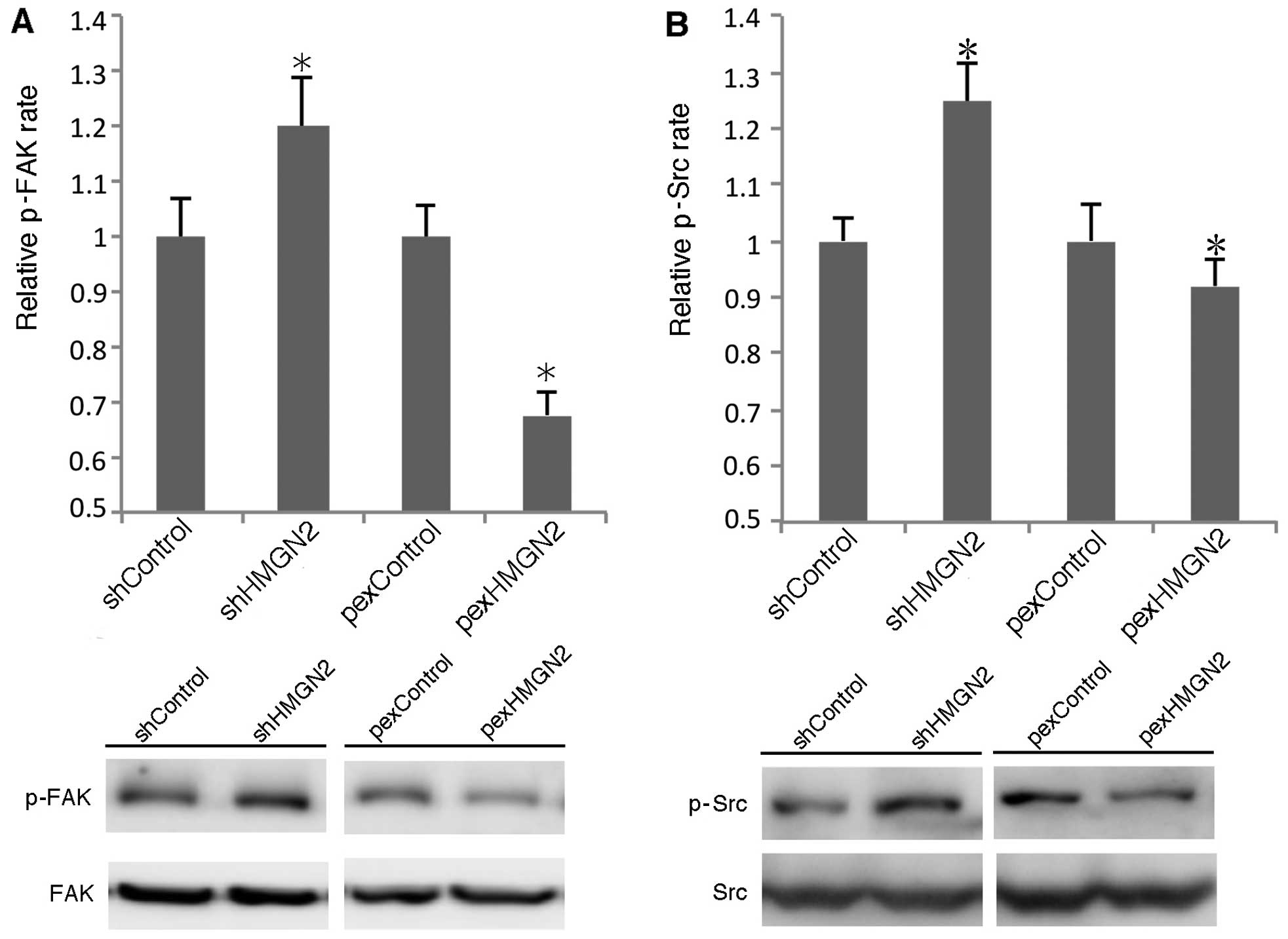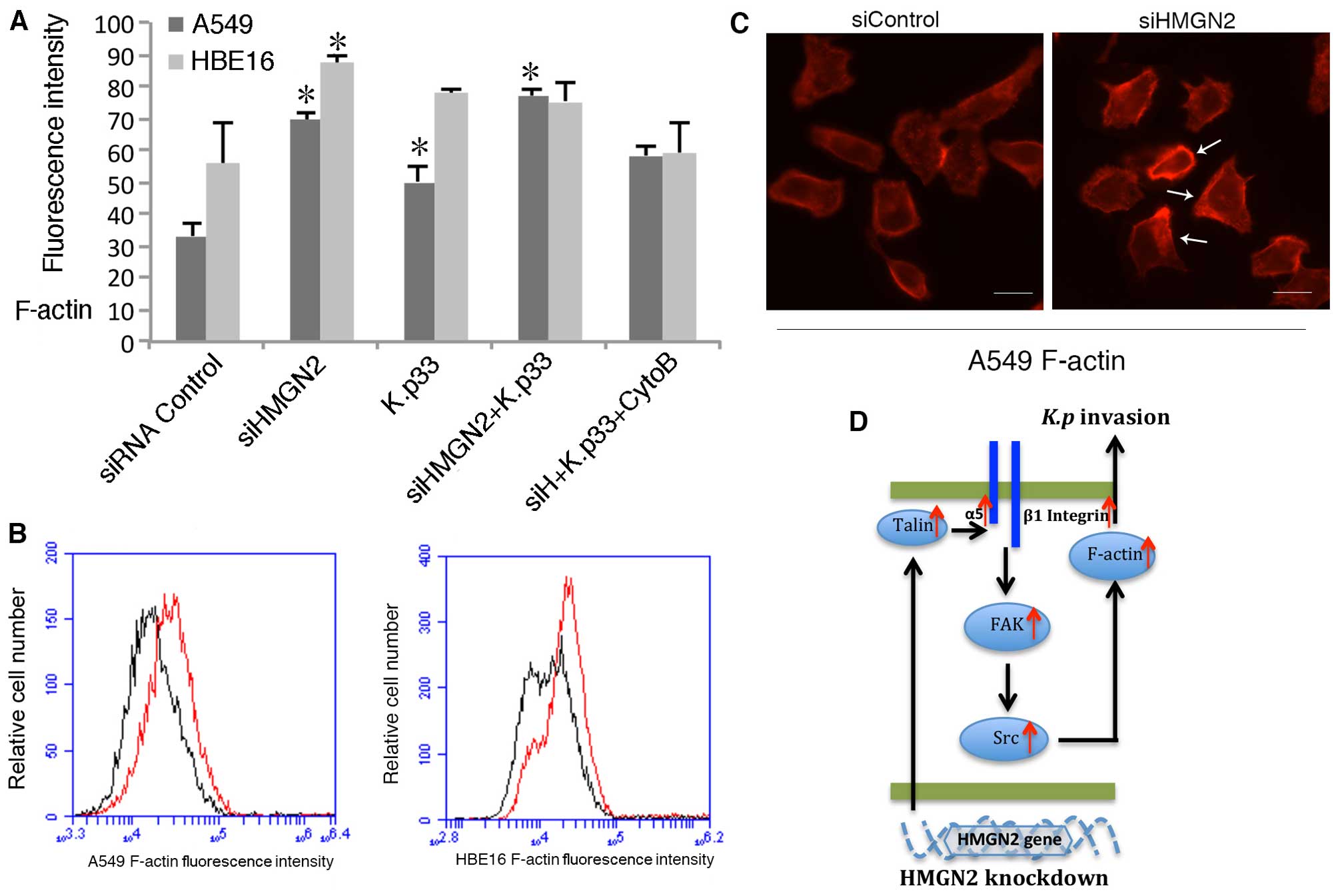|
1
|
Körner U, Bustin M, Scheer U and Hock R:
Developmental role of HMGN proteins in Xenopus laevis. Mech Dev.
120:1177–1192. 2003. View Article : Google Scholar : PubMed/NCBI
|
|
2
|
Mosevitsky MI, Novitskaya VA, Iogannsen MG
and Zabezhinsky MA: Tissue specificity of nucleocytoplasmic
distribution of HMG1 and HMG2 proteins and their probable
functions. Eur J Biochem. 185:303–310. 1989. View Article : Google Scholar : PubMed/NCBI
|
|
3
|
Reeves R and Adair JE: Role of high
mobility group (HMG) chromatin proteins in DNA repair. DNA Repair
(Amst). 4:926–938. 2005. View Article : Google Scholar
|
|
4
|
West KL, Castellini MA, Duncan MK and
Bustin M: Chromosomal proteins HMGN3a and HMGN3b regulate the
expression of glycine transporter 1. Mol Cell Biol. 24:3747–3756.
2004. View Article : Google Scholar : PubMed/NCBI
|
|
5
|
Belova GI, Postnikov YV, Furusawa T,
Birger Y and Bustin M: Chromosomal protein HMGN1 enhances the heat
shock-induced remodeling of Hsp70 chromatin. J Biol Chem.
283:8080–8088. 2008. View Article : Google Scholar : PubMed/NCBI
|
|
6
|
Zhu N and Hansen U: HMGN1 modulates
estrogen-mediated transcriptional activation through interactions
with specific DNA-binding transcription factors. Mol Cell Biol.
27:8859–8873. 2007. View Article : Google Scholar : PubMed/NCBI
|
|
7
|
Deng LX, Wu GX, Cao Y, Fan B, Gao X, Luo L
and Huang N: The chromosomal protein HMGN2 mediates
lipopolysaccharide-induced expression of β-defensins in A549 cells.
FEBS J. 278:2152–2166. 2011. View Article : Google Scholar : PubMed/NCBI
|
|
8
|
Deng LX, Wu GX, Cao Y, Fan B, Gao X, Tang
XH and Huang N: The chromosomal protein HMGN2 mediates the
LPS-induced expression of β-defensins in mice. Inflammation.
35:456–473. 2012. View Article : Google Scholar
|
|
9
|
Feng Y, Huang N, Wu Q and Wang B: HMGN2: a
novel antimicrobial effector molecule of human mononuclear
leukocytes? J Leukoc Biol. 78:1136–1141. 2005. View Article : Google Scholar : PubMed/NCBI
|
|
10
|
Cao Y, Wu G, Fan B, Zheng F, Gao X, Liu N,
Liu X and Huang N: High mobility group nucleosomal binding domain 2
protein protects bladder epithelial cells from Klebsiella
pneumoniae invasion. Biol Pharm Bull. 34:1065–1071. 2011.
View Article : Google Scholar : PubMed/NCBI
|
|
11
|
Wu G, Cao Y, Fan B, Zheng F, Gao X, Liu N,
Liu X and Huang N: High-mobility group protein N2 (HMGN2) inhibited
the internalization of Klebsiella pneumoniae into cultured bladder
epithelial cells. Acta Biochim Biophys Sin (Shanghai). 43:680–687.
2011. View Article : Google Scholar
|
|
12
|
Cossart P and Sansonetti PJ: Bacterial
invasion: the paradigms of enteroinvasive pathogens. Science.
304:242–248. 2004. View Article : Google Scholar : PubMed/NCBI
|
|
13
|
Ulanova M, Gravelle S and Barnes R: The
role of epithelial integrin receptors in recognition of pulmonary
pathogens. J Innate Immun. 1:4–17. 2009. View Article : Google Scholar : PubMed/NCBI
|
|
14
|
Dingemans AM, van den Boogaart V, Vosse
BA, van Suylen RJ, Griffioen AW and Thijssen VL: Integrin
expression profiling identifies integrin alpha5 and beta1 as
prognostic factors in early stage non-small cell lung cancer. Mol
Cancer. 9:1522010. View Article : Google Scholar : PubMed/NCBI
|
|
15
|
Sayeed A, Fedele C, Trerotola M, Ganguly
KK and Languino LR: IGF-IR promotes prostate cancer growth by
stabilizing α5β1 integrin protein levels. PLoS One. 8:e765132013.
View Article : Google Scholar
|
|
16
|
Docheva D, Padula D, Schieker M and
Clausen-Schaumann H: Effect of collagen I and fibronectin on the
adhesion, elasticity and cytoskeletal organization of prostate
cancer cells. Biochem Biophys Res Commun. 402:361–366. 2010.
View Article : Google Scholar : PubMed/NCBI
|
|
17
|
Takagi J, Erickson HP and Springer TA:
C-terminal opening mimics 'inside-out' activation of integrin α5β1.
Nat Struct Mol Biol. 8:412–416. 2001. View
Article : Google Scholar
|
|
18
|
Calderwood DA, Zent R, Grant R, Rees DJG,
Hynes RO and Ginsberg MH: The Talin head domain binds to integrin β
subunit cytoplasmic tails and regulates integrin activation. J Biol
Chem. 274:28071–28074. 1999. View Article : Google Scholar : PubMed/NCBI
|
|
19
|
Lafont F and van der Goot FG: Bacterial
invasion via lipid rafts. Cell Microbiol. 7:613–620. 2005.
View Article : Google Scholar : PubMed/NCBI
|
|
20
|
Agarwal V, Ahl J, Riesbeck K and Blom AM:
An alternative role of C1q in bacterial infections: facilitating
Streptococcus pneumoniae adherence and invasion of host cells. J
Immunol. 191:4235–4245. 2013. View Article : Google Scholar : PubMed/NCBI
|
|
21
|
March C, Moranta D, Regueiro V, Llobet E,
Tomás A, Garmendia J and Bengoechea JA: Klebsiella pneumoniae outer
membrane protein A is required to prevent the activation of airway
epithelial cells. J Biol Chem. 286:9956–9967. 2011. View Article : Google Scholar : PubMed/NCBI
|
|
22
|
Mohan Nair MK and Venkitanarayanan K: Role
of bacterial OmpA and host cytoskeleton in the invasion of human
intestinal epithelial cells by Enterobacter sakazakii. Pediatr Res.
62:664–669. 2007. View Article : Google Scholar : PubMed/NCBI
|
|
23
|
Alexander EH and Hudson MC: Factors
influencing the internalization of Staphylococcus aureus and
impacts on the course of infections in humans. Appl Microbiol
Biotechnol. 56:361–366. 2001. View Article : Google Scholar : PubMed/NCBI
|
|
24
|
Cue D, Southern SO, Southern PJ, Prabhakar
J, Lorelli W, Smallheer JM, Mousa SA and Cleary PP: A nonpeptide
integrin antagonist can inhibit epithelial cell ingestion of
Streptococcus pyogenes by blocking formation of integrin alpha 5
beta 1-fibronectin-M1 protein complexes. Proc Natl Acad Sci USA.
97:2858–2863. 2000. View Article : Google Scholar
|
|
25
|
Vinogradova O, Velyvis A, Velyviene A, Hu
B, Haas T, Plow E and Qin J: A structural mechanism of integrin
alpha(IIb)beta(3) 'inside-out' activation as regulated by its
cytoplasmic face. Cell. 110:587–597. 2002. View Article : Google Scholar : PubMed/NCBI
|
|
26
|
Luo B-H, Carman CV and Springer TA:
Structural basis of integrin regulation and signaling. Annu Rev
Immunol. 25:619–647. 2007. View Article : Google Scholar : PubMed/NCBI
|
|
27
|
Xiao T, Takagi J, Coller BS, Wang JH and
Springer TA: Structural basis for allostery in integrins and
binding to fibrinogen-mimetic therapeutics. Nature. 432:59–67.
2004. View Article : Google Scholar : PubMed/NCBI
|
|
28
|
Tang CH, Keng YT and Liu JF: HMGB-1
induces cell motility and α5β1 integrin expression in human
chondrosarcoma cells. Cancer Lett. 322:98–106. 2012. View Article : Google Scholar : PubMed/NCBI
|
|
29
|
Johnson MS, Lu N, Denessiouk K, Heino J
and Gullberg D: Integrins during evolution: evolutionary trees and
model organisms. Biochim Biophys Acta. 1788:779–789. 2009.
View Article : Google Scholar : PubMed/NCBI
|
|
30
|
Anderson LR, Owens TW and Naylor MJ:
Structural and mechanical functions of integrins. Biophys Rev.
6:203–213. 2014. View Article : Google Scholar
|
|
31
|
Anthis NJ, Wegener KL, Ye F, Kim C, Goult
BT, Lowe ED, Vakonakis I, Bate N, Critchley DR, Ginsberg MH and
Campbell ID: The structure of an integrin/talin complex reveals the
basis of inside-out signal transduction. EMBO J. 28:3623–3632.
2009. View Article : Google Scholar : PubMed/NCBI
|
|
32
|
Margadant C, Monsuur HN, Norman JC and
Sonnenberg A: Mechanisms of integrin activation and trafficking.
Curr Opin Cell Biol. 23:607–614. 2011. View Article : Google Scholar : PubMed/NCBI
|
|
33
|
Campellone KG: Cytoskeleton-modulating
effectors of enteropathogenic and enterohaemorrhagic Escherichia
coli: Tir, EspFU and actin pedestal assembly. FEBS J.
277:2390–2402. 2010. View Article : Google Scholar : PubMed/NCBI
|
|
34
|
Navarro-Garcia F, Serapio-Palacios A,
Ugalde-Silva P, Tapia-Pastrana G and Chavez-Dueñas L: Actin
cytoskeleton manipulation by effector proteins secreted by
diarrheagenic Escherichia coli pathotypes. BioMed Res Int.
2013:3743952013. View Article : Google Scholar : PubMed/NCBI
|
|
35
|
Zhu J, Carman CV, Kim M, Shimaoka M,
Springer TA and Luo BH: Requirement of α and β subunit
transmembrane helix separation for integrin outside-in signaling.
Blood. 110:2475–2483. 2007. View Article : Google Scholar : PubMed/NCBI
|
|
36
|
Dia VP and Gonzalez de Mejia E: Lunasin
potentiates the effect of oxaliplatin preventing outgrowth of colon
cancer metastasis, binds to α5β1 integrin and suppresses
FAK/ERK/NF-κB signaling. Cancer Lett. 313:167–180. 2011. View Article : Google Scholar : PubMed/NCBI
|
|
37
|
Siu MK, Wong CH, Xia W, Mruk DD, Lee WM
and Cheng CY: The β1-integrin-p-FAK-p130Cas-DOCK180-RhoA-vinculin
is a novel regulatory protein complex at the apical ectoplasmic
specialization in adult rat testes. Spermatogenesis. 1:73–86. 2011.
View Article : Google Scholar : PubMed/NCBI
|
|
38
|
Pawlak G and Helfman DM: MEK mediates
v-Src-induced disruption of the actin cytoskeleton via inactivation
of the Rho-ROCK-LIM kinase pathway. J Biol Chem. 277:26927–26933.
2002. View Article : Google Scholar : PubMed/NCBI
|
|
39
|
Crippa MP, Nickol JM and Bustin M:
Developmental changes in the expression of high mobility group
chromosomal proteins. J Biol Chem. 266:2712–2714. 1991.PubMed/NCBI
|
|
40
|
Fein AM: Pneumonia in the elderly:
overview of diagnostic and therapeutic approaches. Clin Infect Dis.
28:726–729. 1999. View
Article : Google Scholar
|















